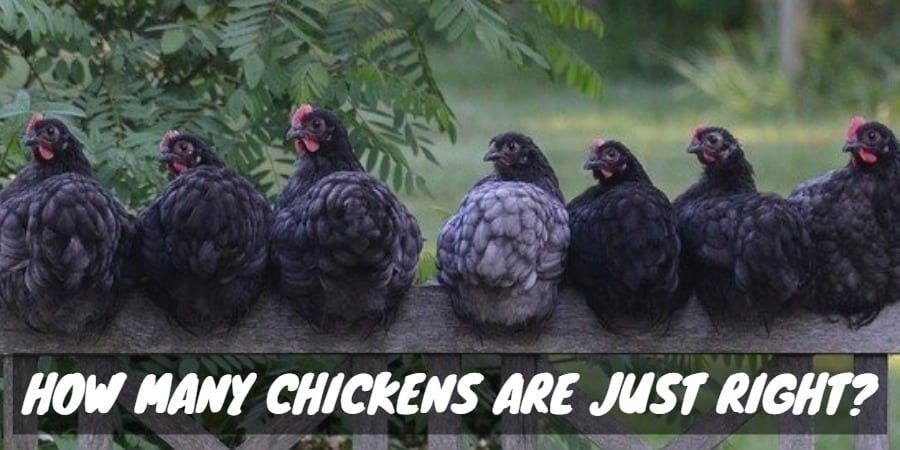Flocks have a social hierarchy that is referred to as their “pecking order.” Chickens are always going to mildly peck each other to determine this order, but the problem comes when they start injuring each other to establish this. To get a handle on this pecking order, let’s look at the different types of pecking and why they occur.
Why Do Chickens Peck Each Other?
There are several reasons which we’re going to look at below. The key to prevention is to first identify and understand the problem.
Feather Pecking
Feather pecking is the action taken when one bird pulls at another bird’s feathers. This can damage the skin of the chicken and can even lead to cannibalism. Natural texture and the appearance of feathers play a vital role in this activity. For instance, laying hens will peck shorter feathers more frequently.
Feather pecking occurs with all types of chickens, free-range or cooped. It’s just more common with commercial birds kept in tight living quarters. When dealing with caged birds, fewer chickens would result in less pecking because the order is more stable.
[amazon box=”B07R4VSKBN”]
Cannibalism
Cannibalism in chickens is a big problem that can happen with birds of any size, breed, and age. It doesn’t just affect chickens, either. Cannibalism can happen with turkeys, quail, and even ducks. Furthermore, it will also occur in all types of housing systems – free-range chickens are no exception.
With that said, cannibalism is a learned behavior that spreads throughout a flock. They are not instinctively driven from birth to devour one another. Chickens accidentally develop this behavior. Poultry will imitate each other, so once they see another of their kind pecking at another hen, they will start to do the same. If you do not watch for this behavior and weed it out quickly, you’ll experience a high injury and fatality rate.
The fact is that cannibalism is much easier to prevent than it is to eradicate. Management plays a huge role here. Problems are less likely to occur when you make sure that preventative measures are taking place.
Monitor Your Chickens

Pecking behavior is actually pretty easy to monitor in your coop if you follow these easy tips:
- Observe your hens and look for any damage to feathers or injuries to their skin.
- Assign a score to the flock. We will look at the scores in a moment.
- Compare the current score to previous scores to determine if there is a growing problem.
Here’s a quick look at a potential scoring system that you can use.
0: Flocks that show very little damage should be given this score.
1: When you notice slight damage to feathers, but the body is still well covered, this is their rating.
2: Severe damage where feathers in a specific area are damaged, exposing skin.
3: Large naked areas with severe damage to feathers and skin.
4: Broken skin with severe feather damage and large areas with the skin exposed.
6 Common Causes of Pecking and Cannibalism in Poultry: Address These to Prevent Pecking
Now that we have looked at some types of pecking that can occur in chickens, let’s look at a few of the causes.
1. Overcrowding
This will almost always lead to pecking and cannibalism. You should provide enough space for chickens to thrive. Overcrowding leads to competition between birds, leading to this behavior. More dominant birds will keep weaker ones away from food and water. When you ensure that your birds have the right amount of feeder space so that they can all eat at the same time, you’ll prevent the weaker ones from being underweight. Thus, also helping to prevent cannibalism.
What is considered adequate floor size? Well, in simple terms, it means that there should be adequate space on the floor for the number of birds in the coop.
You can also install perches that allow multiple birds to perch one at a time. This allows them to escape being pecked from the ground and provides a safe space.
2. Overheating

Higher temperatures will cause chickens to become uncomfortable, and they will be much more prone to pecking. The key is to provide proper ventilation and freshwater for the type of birds you are raising.
[amazon bestseller=”chicken feeder”]
For instance, young brood fowl will need to be at 95 degrees for the first week. That temperature should be lowered by 5 degrees every week until it reaches 70.
With that said, don’t heat the entire facility to that temperature. Create a heat zone and allow chickens to adjust to their level of comfort.
3. Too Much Light
Light plays a pivotal role in the behavior of chickens, and having too much can lead to cannibalistic behavior. Lights that are too bright or have an excessively long period of lighting will cause chickens to become hostile. Try to use less powerful light bulbs with brood fowl. If, however, you are using powerful bulbs for heat, then swap over to infrared.
[amazon bestseller=”coop light bulb”]
Chickens also need at least 8 hours of dark to rest. If you expose them to periods longer than 16 hours of non-stop light, they will become stressed.
4. Inadequate Nutrition

Long story short, chickens will start to eat each other if they are not getting the proper nutrients from their food source. Studies have linked deficiencies in certain nutrients to cannibalistic tendencies. Make sure that your birds are on the proper diet.
You can promote your chicken’s pecking and scratching by raising them on the floor with litter (bedding material), which in turn will decrease their cannibalistic tendencies. Even when food is readily available, chickens still have a natural urge to peck around for food. If their environment does not allow this, then they will start pecking at their flock mates, which could lead to cannibalism.
5. Leaving Injured or Dead Birds in the Flock
Chickens are attracted to blood, so when you leave dead birds lying around, they are going to try them out eventually. This will lead to cannibalism. Furthermore, if a bird is injured, the rest of the flock might start peaking at that injury, again leading to cannibalism.
It’s important to prevent injury while also cleaning up any dead bodies lying around. You should also quickly remove cannibalistic birds, injured, and victims of cannibalism to ensure the habit doesn’t spread.
Natural curiosity and their social order cause chickens to act in this way, so you have to take preventative measures.
6. Mixing Together Different Age and Color Chickens
Combining birds of different breeds or sizes will upset the natural order, which will cause pecking and raise the chances of cannibalism. Avoid mixing different types of birds. If you have different types of chickens, then you need to put them into separate coops.
Prevent Pecking Using This Easy 3 Step Method
Now that you understand some of the reasons why chickens resort to pecking each other let’s look at a simple strategy that you can use to fix the problem before it resorts to cannibalism.
Step 1: Investigate
If the pecking starts to become aggressive, you need to start by looking for why the birds are acting out. Is the environment okay? How many chickens do you have in the area? Does it fall within the appropriate ratio?
There are many reasons for pecking that we have already discussed, so you need to identify the problem. Once you identify the problem, then you need to resolve it. Once you do that, then the problem might go away.
Also, remember that if you add a new hen to the flock, there will be a period of uneasiness. This is natural since chickens need to determine which one is more dominant.
Step 2: Install Chicken Baths
Remember that birds take baths, too, so the next step is to install chicken baths. Chickens bathe differently than you might expect, using a dust bath. They will dig a hole and then cover themselves in loose dirt. So add a few dust baths to your chicken coop:
1. Get a container that is at least 12’’ x 15’’ x 24’’.
2. Mix together sand, wood ash, and soil into the container.
3. Make sure the mixture is loose enough for chickens to roll around in.
As an added bonus, dust baths will keep those nasty external parasites off of your feathered friends.
Step 3: Offer an Alternative

Chickens have a natural drive to peck around for food, so you need to provide them with an alternative to keep their minds occupied. Install interactive objects in your coop to give chickens something to peck. These can be logs, branches, and chicken swings. These toys will also provide a place for weaker birds to escape when they are under attack.
[amazon bestseller=”chicken perch”]
How to Weed out Cannibalistic Chickens
Prevention is the key here, but that is not always possible. So it’s essential that you stop this behavior as quickly as possible. You must do this before it spreads throughout the flock. Here are some steps:
- Separate any birds that are severely pecking others.
- Separate victims of severe pecking.
- Dim the lights.
- Add more feed and water space.
- Add perches.
The real key is to understand the difference between curious pecking and aggressive pecking. Prevent problems before they occur, and you’ll have a flock of happy chickens.





I’m having sever feather and mild level vent pecking in my backyard flocks. I gave them balanced rations, enough space and water yet they are not backing down. I’m watching anyone with crazy pecking behavior and punishing when caught red handed and gets its punishment right away. I’m not sure if it this punishing but I’m expecting it works.
Sorry to hear that you’re having pecking problems with your chickens and I wish I could say that I have a foolproof easy solution for you but please by all means do not “punish” your birds in any way. Aggression breeds aggression and could easily make the situation worse and besides, chickens are just not really that smart and won’t even understand why you are punishing them. Please seek an alternative solution.
My 10 day old chicks have started cannibalism. They are fed organic free from gmo chick crumb, crushed sunflower seeds and meal worms. They have lots of space and plenty of food/water and mud bath and I have reduced their light to 8 hours a day. I take them out side for 40 mins a day and take them out in the evening for cuddle for an hour. I’ve raised chicks before and never have I had cannibalism. The only way I have managed to get them to stop is by spraying dry antiseptic spray on their wounds which is on the back of their heads. It worked for a few days but it’s started again. It’s so horrible to see and I am at my wits end with this
Are they getting enough protein in their diet? Dirt bath is better than mud, which can cause dry itchy skin for the chickens. Omit the mud.
Help my small flock of 4 ladies are suddenly attacking the one who is the leader of the flock. They have all been together for a year and this just started a week ago
I have a young rooster. He has just started pecking the head comb area of a hen that’s been around since the beginning. Like he is not even laying with her. Just pecking her head chasing her down. She squirts. He pecks her brain area. What is causing him to do this?
If a young rooster is attacking/injuring hens you need to remove him asap. He may calm down if separated for a while, or he may not, but aggressive pecking (as opposed to neck grabbing/breeding) is not okay.